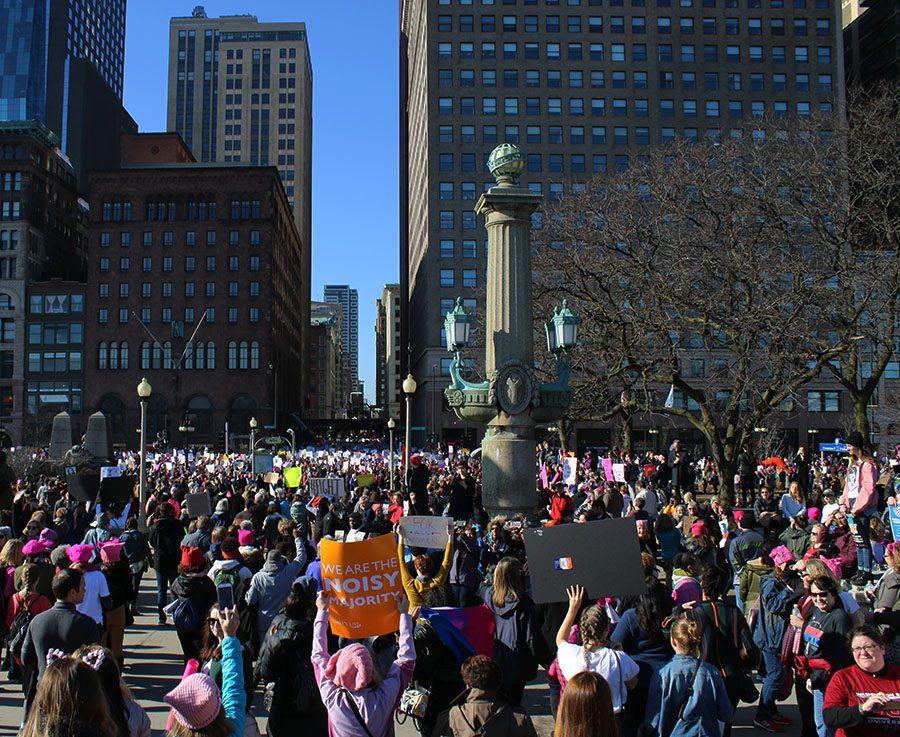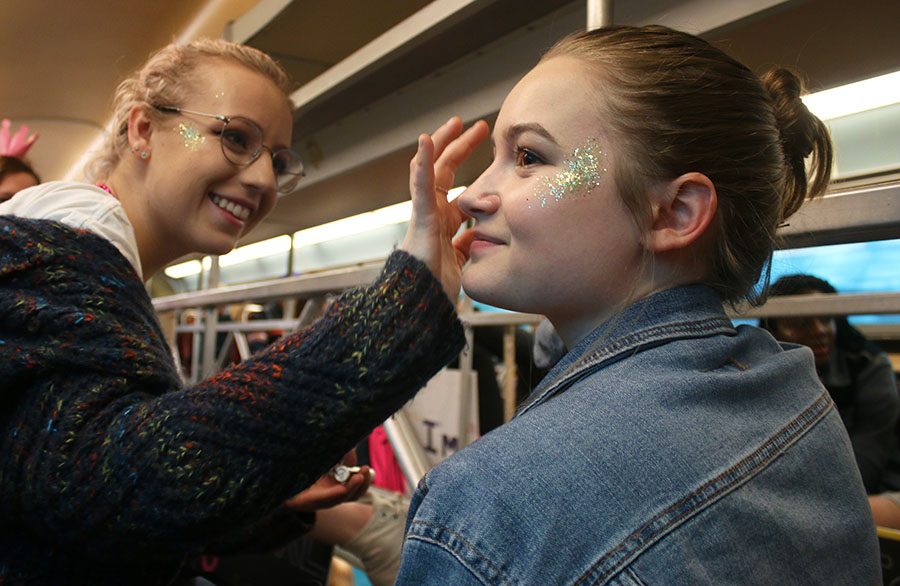An estimated 250,000 (according to the Chicago Tribune) filled the streets of Chicago and marched for women’s rights.
My Experience at the Women’s March on Chicago
“Love Trumps Hate! Love Trumps Hate!” This simple yet complex chant was shouted by my friends and I, along with more than 25 other members of the AdvoCats club at Libertyville High School, which fights for gender equality, at the Women’s March on Chicago this past Saturday, Jan. 21.
According to the Chicago Tribune, 250,000 marchers shattered the predicted 50,000, causing the organizers to originally cancel the march. If a march is cancelled because there are too many participants blocking the route, I’d say that’s not too bad of a reason to stop it.
Word spread that the official march was off and that we would rally in place, but the people wanted to march, so we took to the streets. The Loop was flooded with a lively spirit and supporters who were thrilled to make a difference.
To give some background, the march was initially planned to be held only in Washington, D.C. But it didn’t stop there. In addition to marchers in cities around the U.S., there were an estimated 263,507 out-of-country participants in places like Sydney, Berlin, London, Paris, Nairobi, Cape Town, Ghana, Iceland, Cambodia, Guatemala, Hungary, Saudi Arabia and even Antarctica, according to Bustle, an online women’s magazine. Empowerment was everywhere!
According to political scientists from the Universities of Connecticut and Denver, there were an estimated 3.3 to 4.6 million total marchers in America, larger than the population of Iowa. This means that roughly 1 in 100 citizens marched with zero arrests, making it the largest protest in the history of the United States, according to the Independent, a British newspaper.
The goal of the march was to “Connect, Protect, and Activate,” three words that became the rallying cry of the day. It was scheduled for the day after the inauguration of President Donald Trump to “send the new administration a loud and clear message of support for women’s rights, civil liberties, and diverse issues,” according to the official Women’s March on Chicago’s website.
Many speakers made an appearance to send powerful messages to the crowd. These included a few cast members from “Hamilton” in Chicago; Aislinn Pulley, the lead organizer of Black Lives Matter Chicago; Katie Thiede, the Vice President of Planned Parenthood of Illinois; and Mary Meg McCarthy, the Executive Director of the National Immigrant Justice Center.
Speakers from many different organizations came, proving that the women’s march helped give other minorities, such as the LGBTQ community and Black Lives Matter movement, a voice. Senior Elisabeth Stevens noticed the variety of people and causes there.
“I might have different circumstances, but we are all trying to come together, make ourselves better, and fight for equality! We are helping our brothers and sisters,” Stevens said enthusiastically.
There were a number of chants that echoed throughout the streets in the Loop, such as “this is what democracy looks like,” “yes, we can,” “Donald Trump has got to go” and my personal favorite, “we don’t want your tiny hands anywhere near our underpants.”
The visual aspect of the march was just as empowering. Pink hats in the shape of cat ears, named “pussyhats” after Trump’s vulgar comments towards grabbing women’s genitals, were hand-knitted as a unique visual symbol and sprinkled throughout the crowd, adding to the already immense amount of pink there. The majority of people held decorative posters with similar pro-women and anti-Trump messages. Statements included “Women’s rights are humans rights,” “Girl Power” and “The Future is Female.”
The people who showed up were wonderful. It was refreshing to see not only the young adult social warriors, but also the elderly continuing to protest issues from their time and small children, whose hands were barely big enough to hold up a poster, chanting, “No hate, no fear, immigrants are welcome here.”
These peaceful attendees created an atmosphere that radiated warmth and acceptance. “Thank yous” were heard and free hugs given out. The sounds and sights and love were electrifying. The sense of harmony and unity was endearing.
Senior Blair Abington was originally anxious to go to the march but gained assurance in the cause once she was there.
“I never had a lot of confidence in my belief, but going to the march, it really lifted up my confidence because I realized what I believed in, so many other people believe in. I’m not stupid. I’m not wrong, and I’m going to stand up for what I believe in,” Abington expressed.
Logan Archibald, a senior, was one of the two boys to join in the AdvoCats group at the Women’s March.
“I always bought into the stereotype that feminism is all these radical, belligerent women who are like, ‘Oh, we want everything and are better than men,’”, Archibald commented. “And after a couple weeks at AdvoCats and at the march, now I’m happy to be a feminist. I’m proud to be able to call myself that.”
Over the past few days, the march has received some backlash. A viral video posted by The Blaze featured Tomi Lahren discussing how the women’s march was not logical.
Another popular article was written by Giva Davis for The Odyssey, titled, “I am a female and I am so over feminists.”
The suggestion these women are making is that essentially feminists hate men and believe females are the superior gender. This is not true! Feminism is trying to fight for the equality between men and women that is lacking in society.
So, why did we march?
When I returned to school, my fellow AdvoCats and I were asked this question numerous times by many curious students (a majority of them being male). Shouldn’t we accept the Trump presidency and move on knowing that we still have many rights in today’s society? No.
Ignoring an issue is exactly what we cannot do. The march was not limited to women’s rights. We have to show little boys who look up to their president that they can’t just “grab women by the pussy,” as was stated by Trump in a video released before the election. We have to show mentally disabled people that we won’t stand for any type of harassment and bullying. We have to show Mexicans that they are not all “rapists.” This is so vital for our country now.
As for women’s rights, feminism is a lot more complicated than what it appears to be. Just because oppression may not be faced as often in Libertyville does not mean it doesn’t happen! We will not stand for a president who does not ask for consent. Victims should not be blamed. The wage gap is real. Our bodies are our choice.
We still need to help our fellow humans out in this country, and each other. And that’s what it ultimately comes down to: becoming united to help one another. The march was a love parade to initiate a movement. It gave a light and peace for not only the next four years but for the future of all females.


